Report draft feedback
- Need a project title
- Summary up intervention 3
- Simplify my question from ‘who identify as having anxiety of FOMO’ to ‘who have FOMO anxiety’.
- Add more introduction of what the project is trying to achieve
- No new knowledge and risk-taking included
My previous intervention focused more on the results of FOMO and I neglected the causes of FOMO and people’s understanding of FOMO. I should then focus on how to inspire students to turn their attention to developing self-awareness and personal interests and engaging more meaningfully in real-life experiences.
Intervention 3 feedback
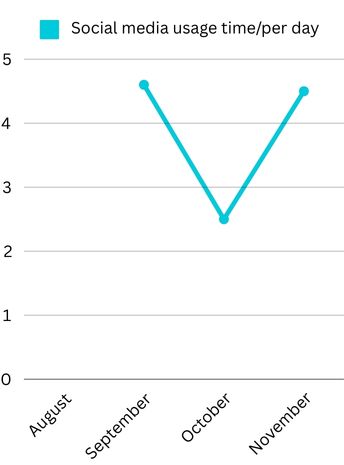
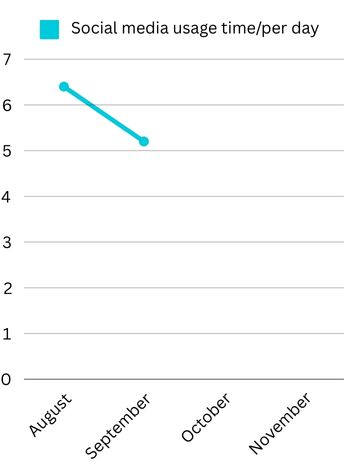
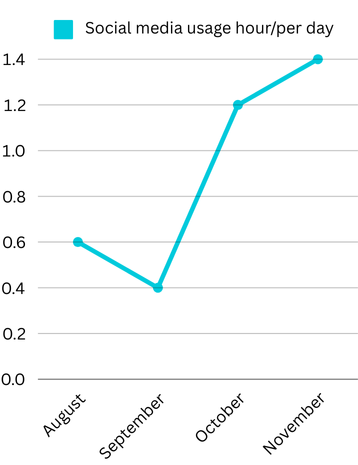
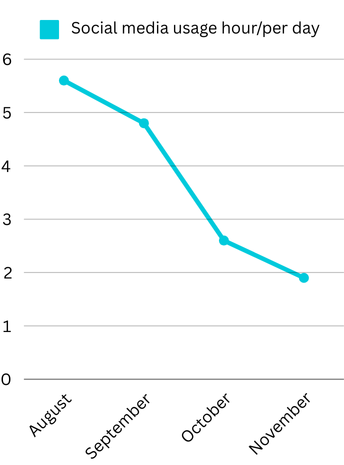
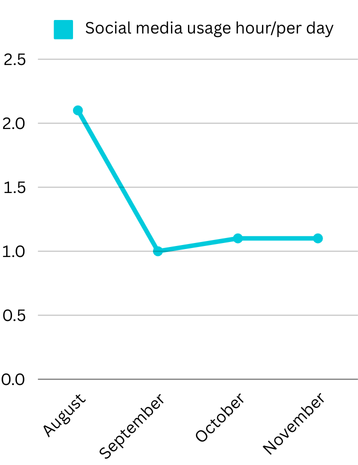
So far there has been no more development in Intervention 3, so I decided to stop it. I created five graphs by combining data from the volunteers’ social media usage from the beginning of August to the beginning of November. In the first month, all the volunteers provided positive feedback and gradually reduced the amount of time they spent on social media each week. From October onwards, Li and Dong’s social media usage started to rebound, and finally, only Yang. Y and Yang. Z’s social media usage continued to decrease. The intervention was a bit of an ‘unsuccessful’ one based on the data alone, but to better understand the feelings of the volunteers, I conducted a questionnaire, and even though Xu dropped out of the programme, I still invited her to give her feedback.






What for you influences the amount of time you spent on social media?

- Daily use
- The pain in the eyes and the anxiety caused by seeing too much
- It has something to do with the tension of study, and playing with friends makes my life more fulfilling
- Effects on physical and mental health
- Addictive, there’s nothing more interesting than a cell phone
What do you do when you’re away from social media?

- Reading and cooking
- Read, study, sleep
- Watching movies and dramas, time will not be so fragmented
- Exercising
- Go out
This questionnaire aimed to gain insight into social media use behaviours and their impact on an individual’s psychological state, especially in the context of social media restrictions. The results of the survey showed that many participants tended to reduce their social media use and that some users were able to switch off instantly or after a while when the restriction time was up, suggesting that they were gradually able to accept the temporary absence of social media. At the same time, the emergence of anxiety was associated with restrictions on social media use, and participants generally agreed that being away from their mobile phones and in contact with nature had a positive effect on relieving anxiety, which provides an important basis for considering the management of social media use in mental health interventions in the future. Li stated that despite the data showing more hours of use, there has been a significant reduction in conscious reliance on mobile phones. Over the project, they have better balance their online and offline time and will put more time into things like reading, cooking, going out, exercising and watching films. Hobbies are therefore very important and this has helped them to refocus on real-life activities.